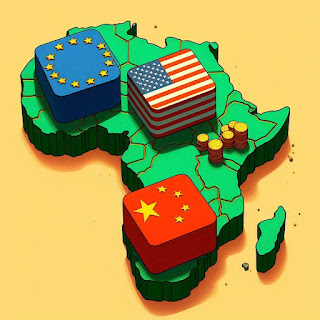SummaryThe Fourth Industrial Revolution, catalyzed by Artificial Intelligence (AI) as a General Purpose Technology (GPT), presents an unprecedented temporal challenge for all parts of society. Unlike the multi-decadal adoption curves of steam, electricity, or ICT, AI promises a productivity revolution within a single decade. It will affects all sectors of the economy, and education is no exception.
This report argues that our current educational infrastructure is dangerously misaligned with this velocity. By applying systems design thinking, we identify the critical "knowing-doing" gap in pedagogy—specifically the underutilization of active learning pedagogies. We propose a radical restructuring of the ISCED framework, supported by AI-enabled "Mastery Guides," to synchronize the Society-Wide Innovation System with the Educational Pipeline.
1. Theoretical Systems Analysis: a Mindmap of Interconnected Systems
To understand the urgency of reform, we must visualize the educational landscape not as a static hierarchy, but as a dynamic flow chart interacting with the broader economy. Imagine a mindmap dominated by two massive, cyclical, mutually interdependent systems: The Society-Wide Innovation System and The Education Pipeline.
System A: The Society-Wide Innovation System
At the macro level, we observe a feedback loop where AI acts as a force multiplier. In this system, AI enables humans to work "smarter" (augmenting cognitive capacity), while humans simultaneously work to make AI "smarter" (refining algorithms and applying them to novel domains).
The health of this system is measured not just by capital investment, but by the efficiency of the Triple Helix model—the symbiotic relationship between:
- Government: Providing regulatory frameworks and funding.
- The Private Sector: Driving commercial application and labor demand.
- The Knowledge Sector (Universities/Research): Generating human capital and intellectual property.
Currently, this system is accelerating. The cycle of innovation is tightening. However, an innovation system is only as robust as its inputs. If the human capital entering this helix is unprepared, the system stalls. This leads us to the second system.

System B: The Education Pipeline (ISCED Levels 0-8)
This system is the "supply chain" for the Innovation System. It is currently functioning with the obsolescence of a 19th-century factory. I do not pretend to know the purpose of education, but it is no longer creating barely literate or numerate workers, or obedient soldiers.
Initial Input: Early Childhood (ISCED 0).
Process: The pipeline must graduate a sufficient density of students (per 100,000 inhabitants) who at the end of the journey possess a dual-competency profile:
- Essential Soft Skills: Problem-solving, complex communication, storytelling, and teamwork (cultivated in ISCED 0-1).
- Hard STEM Skills: High proficiency in Science, Technology, Engineering, and Mathematics as measured by PISA surveys (solidified in ISCED 2-3).
- Global and AI Fluency: Proficiency in at least two foreign languages to facilitate cross-border collaboration.
This vision of the goal of education is widely contested, but at least it focuses on a concrete contribution of education to society. Moreover, it does not mean other purposes can not be added.
The Nexus: Masters and Doctoral Education
The critical intersection of these two systems, the innovation and the education systems, occurs at the graduate level ISCED Levels 7 and 8 (Master’s and Doctoral).
There is a direct causal link: there are no innovative startups or sustainable employment creation without a strong graduate education system.World-class universities (ISCED 6-8) act as the engine room of the innovation Triple Helix. They are where research transitions into commercial viability. However, a university cannot function without a robust undergraduate pipeline (ISCED 6). If students arrive at university accustomed to passive rote memorization, they cannot transition to the knowledge-creation demands of Levels 7 and 8. The failure of the lower levels to prepare students for active inquiry creates a bottleneck that strangles the entire Innovation System.

2. The Pedagogical Paradox: The Knowing-Doing Gap
If we accept that the goal is to produce problem-solvers for an innovation system, we face a paradox.
The Question: Why are the most effective teaching techniques and course design practices the ones that are least frequently applied?
The Evidence: Research by Dr. Carl Wieman (Stanford) and meta-analyses by John Hattie have conclusively demonstrated that "active learning"—specifically methods that put the problem first rather than the lecture first—results in significantly better learning outcomes, retention, and grade performance (Wieman, 2017).
The Friction: Despite this evidence, the "lecture" persists. In my perspective, this is not due to teacher incompetence, but due to systemic bandwidth constraints. Designing high-quality Problem-Based Learning (PBL) or Inquiry-Based Learning (IBL) requires immense preparation time. It requires creating realistic scenarios, scaffolding resources, and personalized feedback mechanisms. In a fossilized system, teachers are overwhelmed by administrative burdens and standardized testing pressures, leaving no capacity for complex course design.
The AI Solution: This is where AI serves as the bridge. AI does not replace the teacher; it removes the friction for course and assessment re-design, allowing the teacher to implement high-impact pedagogy at scale.
3. Practical Part: The AI-Enabled Mastery Guides
The following guides illustrate how AI serves as a "pedagogical co-pilot" to operationalize research-based, active learning. For all activities, probably the most important usage of AI is its ability to adapt reading or writing sytems.
Mastery Guide 1: Project-Based Learning (PBL) – Outside the Classroom
Concept: Students tackle real-world challenges that require extended engagement over time.
Examples; Queenland University of Technology or Delft University have built a special labs where students can work on their projects.
The Friction: Creating locally relevant, complex projects with proper milestones is time-consuming.
The AI Augmentation:- Scenario Generation: AI can scan local news and economic data to suggest project topics relevant to the community (e.g., "Design a water filtration system for the local river using available materials").
- Resource Scaffolding: AI generates a "Project Pack" for the teacher, including timelines, rubric templates, and a list of required materials.
- Student Mentorship: /Specialised AI chatbots serve as "on-demand consultants" for student teams, answering technical questions and prompting critical thinking without giving away the final solution.
Mastery Guide 2: Problem-Based Learning – Online and Inside the Classroom
Concept: Learning is driven by open-ended problems with no single correct answer. The problem comes before the instruction. The activities are lead by the students and take place in the classroom, except the research done between the first, goals session and the second, presentation section.
Examples: PBL is used in most medical programs, and 12 universities decided to deliver all their undergraduate courses in PBL format.
The Friction: Developing "ill-structured", wicked problems that are calibrated to the exact skill level of the class is difficult. It normally requires several iterations.
The AI Augmentation:- Dynamic Difficulty Adjustment: AI analyzes student performance data to generate different problem sets that adapt in real-time. If a group struggles, the AI provides a "hint" or a bridging concept. If they excel, it introduces a new variable.
- Socratic Tutoring: Instead of providing answers, AI interfaces can be programmed to ask guiding questions (e.g., "What principles of physics might apply to this bridge collapse?"), forcing students to articulate their reasoning.
Mastery Guide 3: Inquiry-Based Learning (IBL) – Role-Playing and Simulation
Concept: Students act as professionals (scientists, historians, diplomats) to explore questions. IBL consists of linking each activity or stage to the main, large inquiry questions. The role playing sections can be prepared by doing online simulations on platforms such as Flint.
The Friction: Organizing complex simulations (e.g., a Model UN, decision-making in a corporate boardroom, or a simulated market lab experiment) used to requires massive logistical coordination.
The AI Augmentation:
Simulation Engines: AI can generate text-based or visual simulations. For a history class, an AI can simulate a diplomatic crisis in 1914, where students interact with AI agents representing different countries.
Persona Adoption: AI allows students to "interview" historical figures or scientific theorists. A physics student could debate quantum mechanics with a simulated Niels Bohr, deepening conceptual understanding through dialogue.
Mastery Guide 4: Educational Leadership – Program Coordinators
Concept: Managing the transition from passive to active institutional models.
The Friction: Leaders lack data on which pedagogical interventions are working in real-time, although the Journal of Problem-Based Learning .
The AI Augmentation:
Curriculum Mapping: AI analyzes course syllabi across the institution to identify gaps in skills progression and redundancies in content.
Predictive Analytics: AI identifies students at risk of dropping out based on engagement patterns (not just grades), allowing leaders to intervene with support services proactively.
Resource Allocation: AI optimizes schedule and room usage to facilitate small-group collaboration rather than large lecture halls.
4. Institutional Redesign Strategy: Reimagining the ISCED Framework
To support these Mastery Guides, the physical and organizational structure of education must evolve.
Level 0 & 1: Early Childhood & Primary (The Foundation)
Change: Shift from "subject silos" to "phenomenon-based learning." Programs that involve parents by teaching how to play with their young children, for example, are cost-effective and have positive effects over generations.
Linkage: Focus on oral storytelling and pattern recognition. AI is used here for speech therapy and personalized reading companions, ensuring every child enters Level 2 with high literacy.
Level 2: Lower Secondary (The Pivot)
Change: Introduction of "Interdisciplinary Blocks." Instead of 45 minutes of Math then 45 minutes of Biology, students have 3-hour blocks to solve problems requiring both.
Linkage: Preparation for Level 3 involves mastering the process of inquiry. PISA readiness is achieved not by test prep, but by applying math/science to solve the "ill-structured" problems generated by AI.
Level 3: Upper Secondary (The Specialization)
Change: The "School as Incubator." Students spend 30% of their time on external projects (internships, community research) facilitated by AI project management tools.
Linkage: The curriculum splits into specialized streams, but all streams require a "Capstone Project" that demonstrates readiness for Level 6 (Bachelor's) autonomy.
Level 4 & 5: Post-Secondary/Short Cycle (The Bridge)
Change: Rapid upskilling. Curricula are updated quarterly based on AI analysis of labor market trends.
Linkage: Direct pipelines to local industry. Assessment is competency-based, not time-based.
Level 6: Bachelor's (The Core)
Change: Death of the lecture hall. Content delivery is flipped (consumed via AI-guided adaptive learning outside class). Class time is 100% devoted to discussion, debate, and lab work.
Linkage: Students must demonstrate "research readiness" to progress to Level 7.
Level 7 & 8: Master's & Doctoral (The Innovation Engine)
Change: Integration with the Triple Helix. Dissertations are not just written; they are often prototypes or policy proposals co-developed with industry partners.
Linkage: These levels feed back into the system, producing the educators and policy makers who will refine the cycle for the next generation.
Conclusion
The "atrophied, sclerotic" state of our current education system is not a permanent condition; it is a design flaw. By leveraging AI to democratize access to high-level pedagogical design (Mastery Guides) and restructuring our institutions to value inquiry over memorization, we can close the gap between the speed of AI innovation and the capability of human intelligence.
References
Etzkowitz, H., & Leydesdorff, L. (2000). The dynamics of innovation: from National Systems and “Mode 2” to a Triple Helix of university–industry–government relations. Research Policy, 29(2), 109-123.
Hattie, J. (2008). Visible Learning: A Synthesis of Over 800 Meta-Analyses Relating to Achievement. Routledge.
OECD. (2011). ISCED 2011 Operational Manual: Guidelines for Classifying National Education Programmes and Related Qualifications. OECD Publishing.
Wieman, C. E. (2017). Improving How Universities Teach Science: Lessons from the Science Education Initiative. Harvard University Press.




























